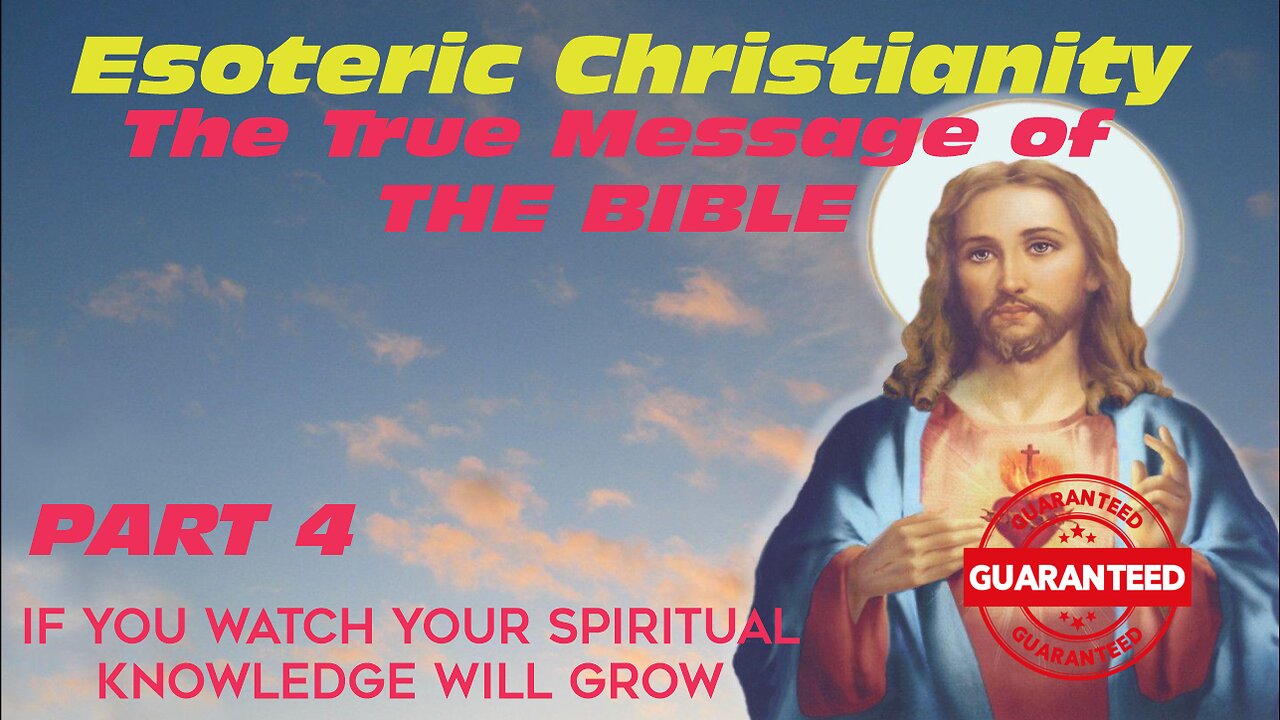Premium Only Content

Esoteric Christianity Part 4 Love Is The Highest Wisdom
Love is the highest wisdom.
We tend to use the word love in a way that lessens it or disfigures it. When we use it to describe very superficial, transitory type things. Real love is what the soul is always yearning for to be close to. Love is happiness which all of us, in our depth, wish to have.
There is nobody who wants to avoid happiness. Everybody wants to have happiness. It is just that our ideas of what happiness is, tends to be confused. So, we end up not actually doing the things or behaving in the way that will bring us towards it.
In our previous lectures, we introduced Esoteric Christianity as a form of Christianity is deeper than normally taught in the public today. There has always been the inner doctrine, which relates to certain ways of understanding the scriptures. Never forget that the true content of esoteric Christianity has something to do within us. The content of our soul of our spirit. That is the esoteric doctrine. The doctrine within, which unfolds itself through our experience, through our spiritual work. That is the real Esoteric Christianity. Because within us is a divinity, some spark of light, some connection, to the universal light that we call Christ: that light within us.
We discussed the beginning of the book of John, and we took apart some of the Greek words.
In particular, in the very beginning (John 1:1), when it says:
En arche en o logos.
“In the beginning was the word.”
We normally view this temporally, meaning some point in time in the past. But we need to look at that beginning as a point in our interior space. Within that origin is the activity of the logos. The activity of Christ is at our origin. And the light emerges from our origin, or the beginning.
Therefore, this is not something that happened a long time ago. This is something that we inspect, we can experience at any time. When we look within ourselves profoundly, we can find the origin of our activity, which is the Verb, the Word, the Logos.
Unfortunately, what usually occurs is we only find is the activity of our mind, and our heart (emotions). Obviously, what is going on in our mind is not close to the qualities of Christ, Universal Love. Instead, what we will find within ourselves is suffering and contradiction, desires, conditioned ways of thinking and behaving, and ignorance.
But if you keep our attention, and you follow the light of your consciousness, you can unweave the very fabric of your mind. There you will find there is a deeper level of activity.
We must keep going deeper.
People think that their “truth” is the thoughts and the emotions they can feel at any particular moment. They think that is their authentic truth. Yet, they have never inquired beyond that or deeper than that.
We must understand that there is consciousness or cognizance, which is aware of those thoughts. If you follow that light of awareness, you can penetrate through your superficial mind, through your thoughts, and go to something deeper. If you keep following that then you will find a more radical origin.
Any one of us can do that. That is what this doctrine teaches. Perhaps it is easier said than done, but perhaps we just need to make the effort.
There is a lot to do with the way we behave in the world that prevents us from having that type of access, so that we can experience that universal compassion.
We must perform a psychological work, to transform our soul, to develop our soul.
In the book of John, the first miracle that Jesus performs, is at the wedding. Where he transforms or transmutes the water into wine. We are going to look at this scripture to understand how it has to do with our spiritual work. Obviously, the common interpretation that Jesus came to a wedding in some literal historical past and decided it was a good idea to help the celebrants become intoxicated with wine has nothing to do with Christianity. That is a very superficial, ignorant analysis.
Let us read John 2.
1 And the third [Gimel ג] day [יום yom] there was a marriage in Cana of Galilee [גליל]; and the mother of Jesus [Ἰησοῦ, יהשוה] was there:
2 And both Jesus was called, and his disciples, to the marriage.
3 And when they wanted wine, the mother of Jesus saith unto him, They have no wine.
4 Jesus saith unto her, Woman, what have I to do with thee? mine hour is not yet come.
-
 9:32
9:32
MagnumOpus333
12 days agoWhat truly dies… and what truly remains?
262 -
 LIVE
LIVE
Kimberly Guilfoyle
1 hour agoMaking DC Safe Again, Live with Daily Signal's Tyler O'Neil | Ep249
10,499 watching -
 LIVE
LIVE
Dr Disrespect
5 hours ago🔴LIVE - DR DISRESPECT VS. JEAN-CLAUDE VAN DAMME - HITMAN
1,802 watching -
 LIVE
LIVE
The HotSeat
1 hour agoTrump Drops Hammer: Burn the Flag = 1 Year Prison! Army Deployment Next?!
761 watching -
 LIVE
LIVE
Jamie Kennedy
19 hours agoThe Truth About Anger, Race, & Feminine Energy w/ Jesse Lee Peterson | Ep 219 HTBITY
105 watching -
 1:45:39
1:45:39
The Quartering
5 hours agoMMA Fighter Tries To K*LL Wrestler, Hollywood PANIC & Sam Tripoli's Favorite Conspiracies
96.6K140 -
 1:05:04
1:05:04
Mark Kaye
4 hours ago🔴 Trump Sends Dems Into RAGE Over Flag Burning Executive Order
4.12K12 -
 LIVE
LIVE
Film Threat
18 hours agoVERSUS: AUGUST BOX OFFICE BLOOD BATH! MARVEL IS COOKED! | Film Threat Versus
96 watching -
![[Ep 734] Leftists Support of Black-on-Black Crime | Bolton Raid / Media Hypocrisy](https://1a-1791.com/video/fww1/0e/s8/1/a/F/p/c/aFpcz.0kob-small-Ep-734-Leftists-Support-of-.jpg) LIVE
LIVE
The Nunn Report - w/ Dan Nunn
1 hour ago[Ep 734] Leftists Support of Black-on-Black Crime | Bolton Raid / Media Hypocrisy
210 watching -
 29:39
29:39
Afshin Rattansi's Going Underground
1 day agoEx-Israeli PM Ehud Olmert: INTOLERABLE Amount of Innocent Palestinians Have Been Killed in Gaza
1.73K26